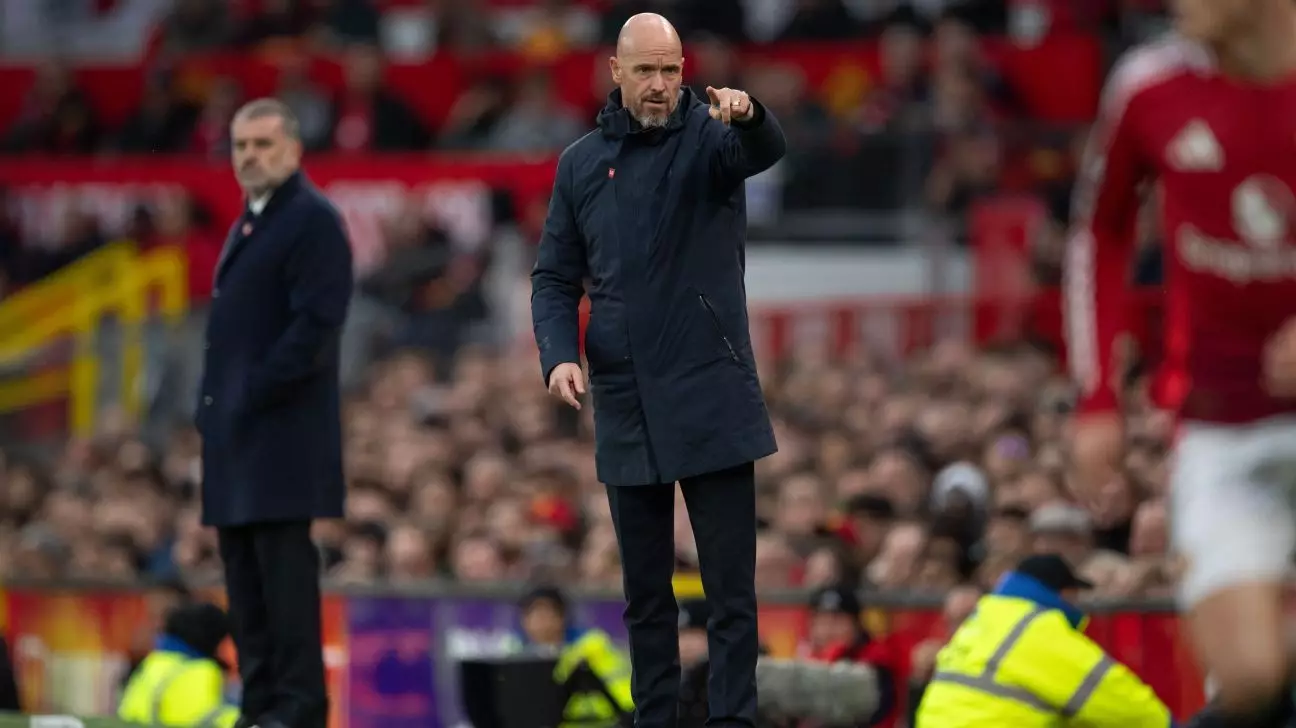The start of the 2023-2024 season has been riddled with challenges for Manchester United, culminating in a disheartening 3-0 defeat at Old Trafford against Tottenham Hotspur on September 29. The loss not only raised questions about the team’s form but also about the strategic acumen of their manager, Erik ten Hag. However, what stood out post-match was Ten Hag’s insistence on downplaying the implications of this defeat, largely due to the controversial red card issued to United’s captain, Bruno Fernandes. The card, which was ultimately rescinded, was a focal point of Ten Hag’s argument that the match should not be used as a definitive measure of the team’s capabilities.
The atmosphere during the match was tense. With Tottenham leading 1-0, Fernandes received a straight red card for a challenge on James Maddison, a decision that visibly affected the players and fans alike. This pivotal moment not only altered the dynamics of the match but also put additional pressure on United, who were already grappling with their form. Fernandes’ immediate reaction—voicing that Maddison himself believed it was not a sending off—highlights the contentious nature of officiating in football. Ten Hag, in his post-match analysis, defended his players, emphasizing that the sending-off undermined their chances of a comeback. He expressed a sentiment echoed in many dressing rooms: officiating can sometimes overshadow the game itself.
With the Football Association later overturning the red card, Ten Hag seemed to find a reprieve. “I deny that game, ignore that game against Spurs,” he asserted, suggesting that the circumstances surrounding the match distorted the team’s potential performance. Such pronouncements can be seen as a defensive strategy, aimed at preserving morale and focusing the squad’s attention on future challenges rather than lingering on past disappointments.
Despite the setbacks, Ten Hag’s messaging leaned heavily on resilience and determination. In the face of adversity, he praised his players’ character, indicating that their collective spirit would usher in better results in the future. This requires a balance of optimism and realism; while resilience is crucial, building a consistent performance also relies on the tactical setup and player availability. Ten Hag’s optimism was evident in his remarks post-draw with Fenerbahce, where he noted that the squad demonstrated potential when given the right conditions.
Moreover, Team United is indeed experiencing turmoil with injuries sidelining players like Luke Shaw, Leny Yoro, Tyrell Malacia, and Mason Mount. Ten Hag pointed out that the absence of key players significantly hampers the team’s potential, stating, “When you don’t have the players available, you can’t line up the best team.” This reality complicates the manager’s ability to instill confidence when the team’s performance fluctuates, often making it seem like they are in a constant state of rebuilding rather than thriving.
Looking ahead, Manchester United faces an uphill battle. They are set to clash with West Ham in the Premier League, a fixture that will test their mettle yet again. The journey towards stability hinges on the players returning to form and fitness. Ten Hag’s calls for unity among the players, coaching staff, and administrative personnel are pivotal. Ultimately, cultivating a culture of readiness is crucial, allowing the team to tackle both domestic and European challenges head-on.
As the season unfolds, the capacity of United to transform potential setbacks into opportunities for growth will dictate their trajectory. Erik ten Hag’s leadership is put to the test, but it may very well be in the face of difficulty that United re-emerges as a formidable contender in the league. Resilience, once again, becomes the cornerstone of their ambitions—one that requires not just a tenacious spirit, but practical solutions to the myriad challenges they face. The optimism in Ten Hag’s tone reflects a hope that, despite early bumps, the squad has what it takes to reclaim its place among the elite of English football.
